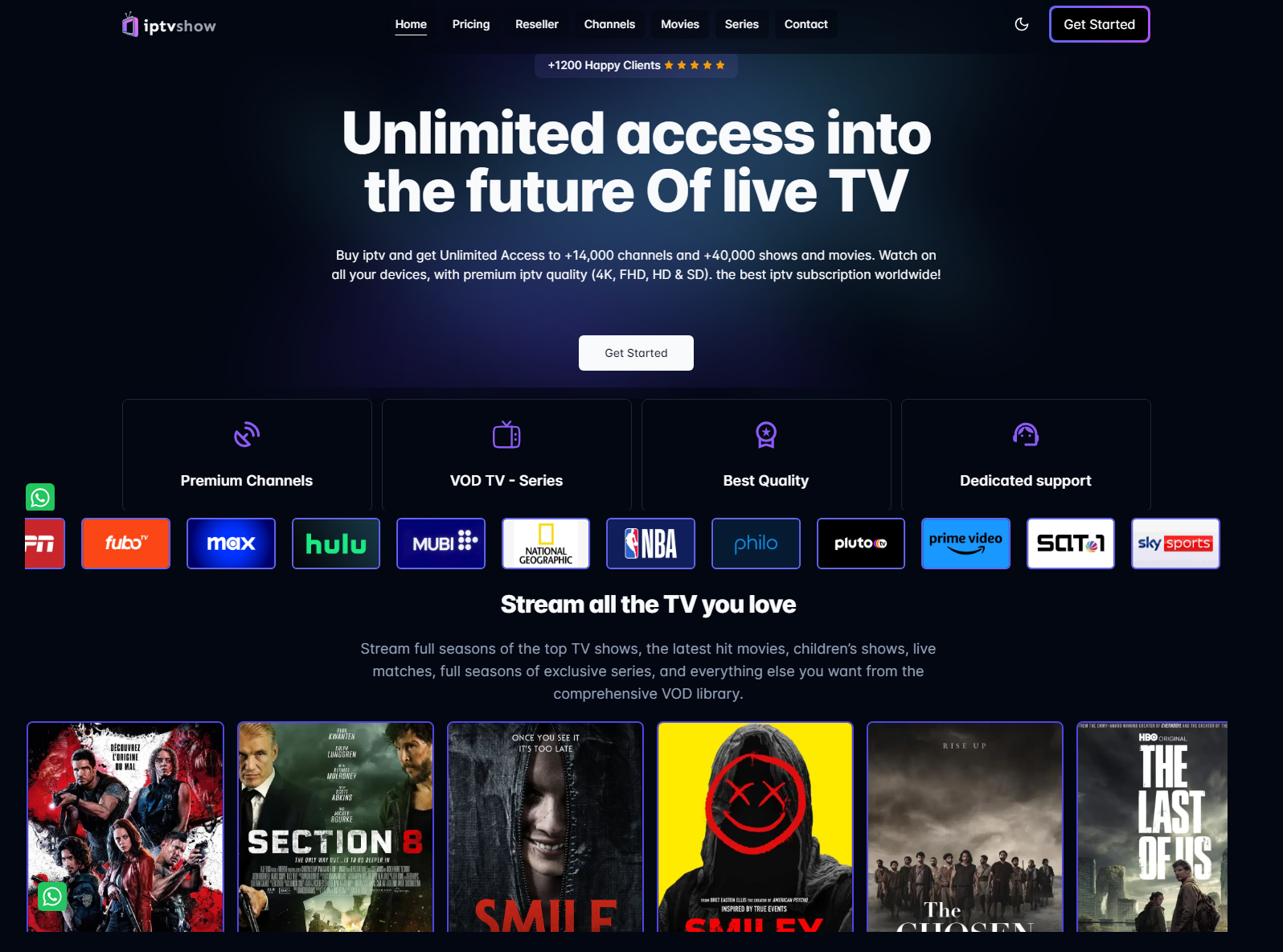IPTV is a method of delivering television content over internet protocol networks. How IPTV Works? Unlike traditional television formats such as terrestrial, satellite, and cable, IPTV offers a more flexible and convenient way to access TV shows, movies, and other content. With IPTV, content is delivered through the internet, allowing users to stream a live TV and on-demand content from various devices, including smart TVs, computers, tablets, and smartphones.
IPTV is reshaping how we consume media by providing a customizable and interactive viewing experience. Traditional TV services deliver content in a linear fashion, meaning you have to watch shows at scheduled times. In contrast, IPTV allows for time-shifted media, enabling viewers to watch what they want, when they want.
Table of Contents
Benefits of IPTV
IPTV offers numerous advantages that make it an attractive option for viewers:
- Flexibility and Convenience: IPTV allows you to watch your favorite shows and movies on various devices, whether you are at home or on the go.
- Cost Savings: IPTV services are often more affordable than traditional cable or satellite TV, and they typically offer more flexible subscription plans.
- Variety of Channels and Content: IPTV services provide access to a wide range of channels, including international options, and a vast library of on-demand content.
By subscribing to IPTV services such as Alivetvservices.com, IPTVShow.net or AliveTVProvider.com, you can enjoy a superior viewing experience tailored to your preferences.
The Technology Behind IPTV
Internet Protocol (IP) Explained
The fundamental technology behind IPTV is the Internet Protocol (IP), which is the method by which data is sent from one computer to another on the internet. IP is responsible for addressing and routing data packets so that they can travel across networks and arrive at the correct destination.
In the context of IPTV, IP enables the transmission of video and audio content from servers to end-user devices. This technology allows for efficient streaming of high-quality video content over the internet, ensuring a seamless viewing experience.
IPTV Protocols, How IPTV Works?
IPTV relies on specific protocols to deliver content efficiently:
- IPTV Multicast: This protocol allows the transmission of data to multiple users simultaneously. It is commonly used for live streaming events and broadcasts, where the same content is delivered to numerous viewers at the same time.
- IPTV Unicast: This protocol delivers data to a single recipient at a time. It is typically used for Video on Demand (VOD) services, where users request specific content individually.
Comparison Table: Multicast vs. Unicast
| Protocol | Use Case | Benefits | Drawbacks |
|---|---|---|---|
| Multicast | Live Streaming | Efficient bandwidth usage | Limited interactivity |
| Unicast | Video on Demand (VOD) | Personalized content delivery | Higher bandwidth requirements |
IPTV Streaming Process
The IPTV streaming process involves several steps to deliver content from providers to viewers:
- Content Creation and Encoding: TV channels and content creators produce shows, movies, and other media. This content is then encoded into digital formats suitable for streaming.
- Content Delivery Networks (CDNs): The encoded content is distributed to various servers located around the world via CDNs, ensuring that it is delivered efficiently to users regardless of their location.
- Buffering and Streaming Quality: To provide a smooth viewing experience, IPTV services use buffering techniques to preload content. This helps prevent interruptions and ensures high-quality streaming.
IPTV Infrastructure
Key Components of IPTV Systems
An IPTV system consists of several key components that work together to deliver content to users:
- Servers and Data Centers: These are the backbone of IPTV services, storing and delivering content to end-user devices.
- Middleware: This software manages the interaction between the user and the IPTV service, handling tasks such as user authentication, content management, and billing.
- End-User Devices: These include IPTV set-top boxes, smart TVs, mobile devices, and computers that receive and display the content.
Role of ISPs in IPTV
Internet Service Providers (ISPs) play a crucial role in the IPTV ecosystem. They provide the necessary bandwidth and infrastructure to deliver content to users. The quality of an IPTV service is often dependent on the reliability and speed of the user’s internet connection.
Net Neutrality is another important factor that affects IPTV. It ensures that ISPs treat all internet traffic equally, without giving preference to certain services. This principle is vital for maintaining a fair and competitive environment for IPTV providers.
Types of IPTV Services
A Live IPTV
A Live IPTV allows users to stream television channels in real-time, just like traditional broadcast TV. This service is ideal for watching live events such as sports, news, and entertainment shows. Popular examples of live IPTV services include live sports packages and international news channels.
Recommendations
Explore top-rated IPTV services tailored for the USA market at A LiveTV.com, AliveTVProvider or IPTVShow. For more insights into USA IPTV and to compare leading providers, visit our detailed guide on IPTV Services.
Elevate your TV viewing experience with USA IPTV—your gateway to limitless entertainment possibilities!
Video on Demand (VOD)
Video on Demand (VOD) services provide users with access to a library of pre-recorded content that they can watch at any time. This includes movies, TV series, documentaries, and more. VOD allows for a highly personalized viewing experience, giving users the freedom to choose what to watch and when to watch it.
Time-Shifted IPTV
Time-Shifted IPTV offers viewers the ability to watch previously aired television programs. This includes:
- Catch-up TV: Allows users to watch shows that were broadcast hours or days earlier.
- Start-over TV: Lets viewers restart a live broadcast from the beginning.
Examples of Time-Shifted IPTV Services
- Catch-up TV services from major broadcasters
- Start-over TV features on premium IPTV subscriptions
Setting Up IPTV
Required Equipment
To set up IPTV, you need the following equipment:
- Reliable Internet Connection: A high-speed internet connection with at least 10 Mbps is recommended for smooth streaming.
- IPTV Set-Top Box: Devices such as Roku, Amazon Fire Stick, or a dedicated IPTV box.
- Compatible Devices: Smart TVs, smartphones, tablets, and computers that can run IPTV apps.
Installation and Configuration
Setting up IPTV is a straightforward process:
- Connect Your Device: Plug in your IPTV set-top box to your TV and connect it to the internet.
- Install IPTV App: Download and install the IPTV app on your device.
- Subscription Setup: Subscribe to a service likeA LiveTV.com, IPTVShow.net or AliveTVProvider.com and enter your login details in the app.
- Start Watching: Browse and start watching your favorite channels and content.
By following these steps, you can enjoy the diverse and rich content offered by IPTV services.
Security and Privacy in IPTV
Encryption and Security Protocols
Security is a critical aspect of IPTV. IPTV providers use encryption and security protocols to protect content and user data. Common security measures include:
- Encryption: Secures the data transmitted between the server and the user’s device.
- Authentication: Ensures that only authorized users can access the content.
Protecting
Your Privacy
Privacy is equally important for IPTV users. Using a VPN (Virtual Private Network) can help protect your identity and data while streaming IPTV content. Additionally, practicing safe browsing habits and using reputable IPTV providers can further enhance your security.
Legal Aspects of IPTV
Licensing and Regulations
IPTV services must comply with various licensing and regulatory requirements to operate legally. This includes obtaining the necessary licenses to distribute content and adhering to copyright laws. The regulatory environment can vary significantly from one country to another, impacting how IPTV services are provided and consumed.
Risks of Illegal IPTV Services
Using illegal IPTV services can have serious consequences:
- Legal Issues: Users may face fines or legal action for accessing copyrighted content without proper authorization.
- Poor Service Quality: Illegal services often suffer from unreliable performance and poor streaming quality.
- Security Risks: These services may expose users to malware and other security threats.
It’s always best to use legitimate IPTV providers like A LiveTV.com, IPTVShow.net or AliveTVProvider.com to ensure a safe and high-quality viewing experience.
Future of IPTV
Technological Advancements
IPTV technology continues to evolve, driven by advancements in internet infrastructure and streaming technologies. The rollout of 5G networks promises to significantly enhance IPTV performance, providing faster and more reliable connections.
Market Trends
The IPTV market is experiencing rapid growth, with more consumers opting for internet-based TV services. Trends indicate a continued rise in IPTV adoption, fueled by the demand for on-demand content and personalized viewing experiences.
Market Growth Statistics
| Year | IPTV Subscribers (millions) |
|---|---|
| 2020 | 150 |
| 2022 | 180 |
| 2024 | 210 |
Frequently Asked Questions about IPTV
How does IPTV differ from traditional TV?
IPTV delivers content over the internet, providing more flexibility and interactive features compared to traditional TV, which relies on cable or satellite signals.
What internet speed is required for IPTV?
A minimum internet speed of 10 Mbps is recommended for standard definition (SD) streaming, while 25 Mbps or higher is ideal for high definition (HD) and 4K content.
Can IPTV be used on multiple devices?
Yes, IPTV can be accessed on various devices, including smart TVs, computers, tablets, and smartphones, often with the ability to use multiple devices simultaneously.
Is IPTV legal?
IPTV is legal when provided by licensed and authorized providers. It’s important to choose reputable services like A LiveTV.com, IPTVShow.net or AliveTVProvider.com.
How do I choose the right IPTV provider?
Consider factors such as content variety, streaming quality, customer reviews, and subscription costs when choosing an IPTV provider. Reputable options include A LiveTV.com, IPTVShow.net and AliveTVProvider.com.
Conclusion
Summary of Key Points
IPTV revolutionizes the way we consume television by delivering content over the internet. It offers numerous benefits, including flexibility, cost savings, and access to a wide range of channels and on-demand content.
Final Thoughts
Exploring IPTV options can greatly enhance your viewing experience. With advancements in technology and a growing market, IPTV is set to become the future of television. Consider subscribing to trusted services like A LiveTV.com, IPTVShow.net or AliveTVProvider.com to enjoy a seamless and high-quality IPTV experience.
Additional Resources
Links to Useful Articles and Guides
- Best IPTV Service Providers in 2024
- How to Troubleshoot IPTV Streaming Issues
- Top Accessories for Enhancing Your IPTV Experience
Video Tutorials and Demos
By utilizing these resources, you can further deepen your understanding of IPTV and make the most out of your IPTV subscription.



